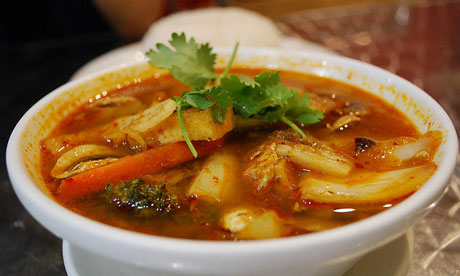
Avoiding stomach bugs when overseas doesn't necessarily mean avoiding the best of the local food. Dine in pleasure with our top tips...
Travellers often worry about the water when they’re away, but foreign food is often most likely to make you ill. In your home environment you are immune to a lot of the common bugs; travellers, though, tend to eat food prepared by others, and if hygiene standards slip or refrigeration fails, that’s when gastroenteritis can strike.
The biggest source of abdominal grief occurs when other people’s ‘friendly’ colonic bacteria get inside your insides. The best precaution is to choose piping-hot food, and to avoid foods that might have been handled by others after cooking and cooling.
It is also worth dropping the ‘five-a-day’ habit when in resource-poor destinations: fresh fruit, raw salads and uncooked vegetables might be laced with harmful bacteria. For example, lettuce may have been irrigated with ‘night soil’ (human faeces) or strawberries grown too close to contaminated ground.
There is quite a clutch of infective hazards, especially in South-East Asia where people eat raw or flash-fried seafood and wildlife from ponds or rice fields. Parasites include gnathostomiasis, which sets up home under your skin as odd little lumps.
There are also foods that can be toxic if incorrectly prepared. Puffer fish (fugu), popular in Japan, can kill you if you eat the wrong part of it, while cassava (aka manioc) contains cyanide – both need to be prepared by a local expert. I’d also suggest avoiding eating animal brains as there is a risk of contracting some odd slow viruses akin to mad cow disease.
I met a Japanese man in Nepal who was so scared of getting ill he ate nothing but boiled eggs and bananas, and drank only whisky. I wonder why he picked a resource-poor destination if he was going to worry that much.
Are you a culinary adventurer or do you pick only the recognisable foods on the menu? Descriptions can be misleading: in Italy ‘cat’s tongues’ are excellent chocolate-dipped biscuits; in Indonesia ‘cow’s eyes’ are fried eggs; in Brazil ‘ladies’ saliva’ is a dessert made of raw eggs, sugar and coconut milk. Sometimes you never can work out quite what you’ve eaten.
Don’t try to ‘immunise’ yourself by eating or drinking high-risk local products ‘like the locals do’. Although people who travel a great deal do build up some resistance to mild travellers’ diarrhoea – the 36- to 48-hour upset – eating contaminated food also puts you at risk of serious and sometimes life-threatening infections including dysentery and paratyphoid, as well as unpleasant infections such as hepatitis E and various species of worms.
Lots of research has gone into discovering ways of avoiding gastroenteritis, and the probiotic and ‘friendly bacteria’ products looked promising. While they are certainly useful in rehabilitating after gastroenteritis, there is little evidence that they actually protect you from getting it in the first place.
Similarly, taking antibiotics in order to avoid stomach upsets is seldom recommended for anyone – except possibly those going on very short business trips.
Rifaximin (Xifaxan) has been promoted in the US since 2004 for the treatment and sometimes prevention of travellers’ diarrhoea but it is probably only effective against E coli infections and not against other more serious causes of gastrointestinal outpourings, nor is it any use against viral gastroenteritis.
Also, it is rather expensive to use as a long-term preventive against gastroenteritis and it is not currently available in the UK. Quite a range of antibiotics will cure travellers’ diarrhoea once it has started but it is best to wait until getting sick before taking any of them.
Dukoral oral cholera vaccine, on the other hand, may give some protection against travellers’ diarrhoea. Undoubtedly it protects well against cholera, although recent reviews of its protective efficacy against other filth-to-mouth diseases are disappointing.
The best strategy is just to try to eat only freshly cooked hot food.